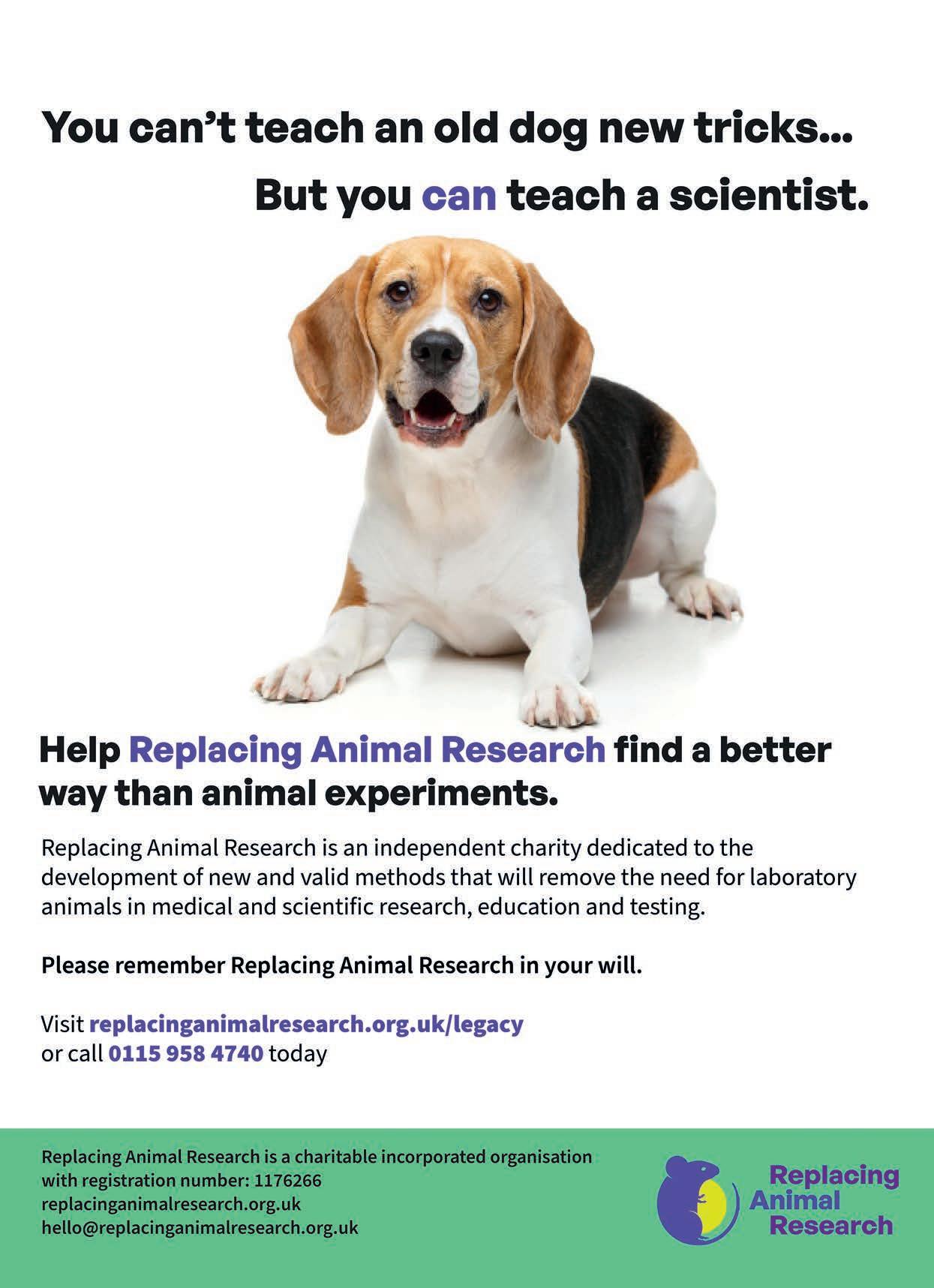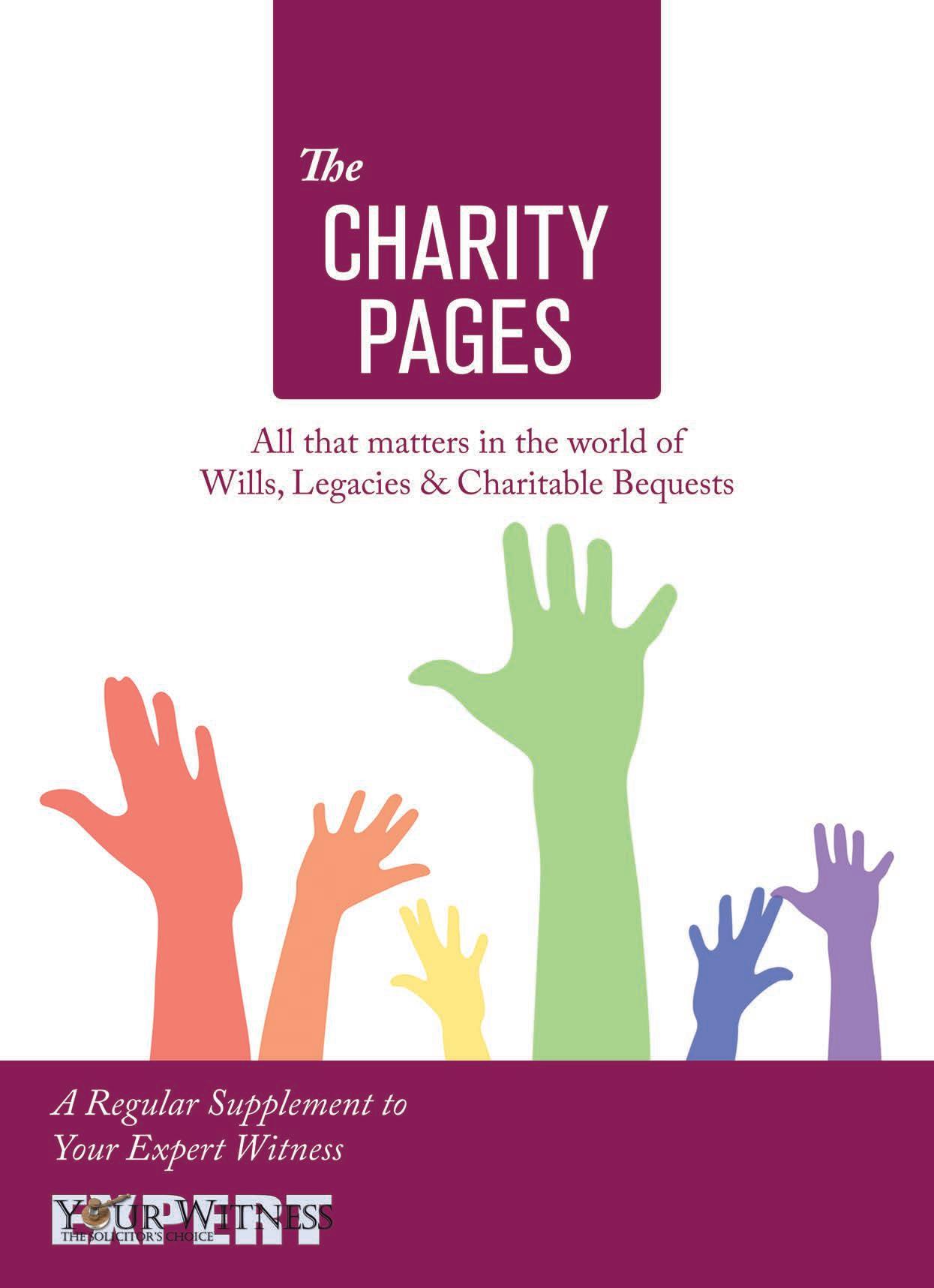

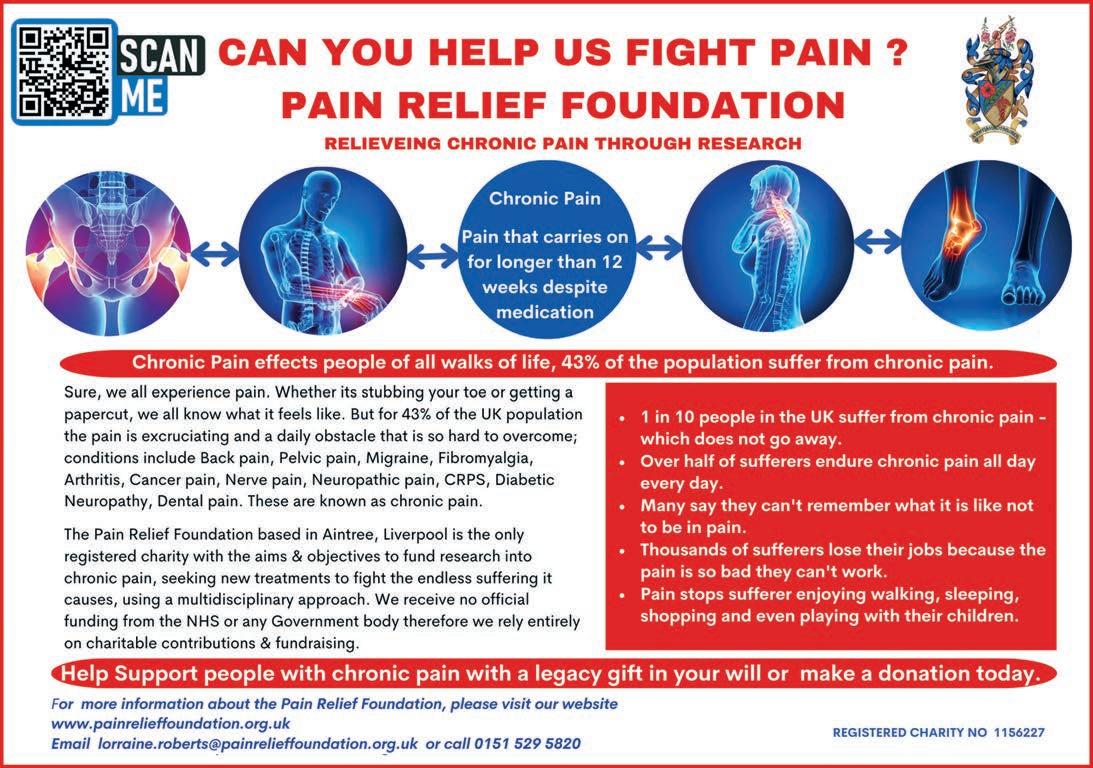
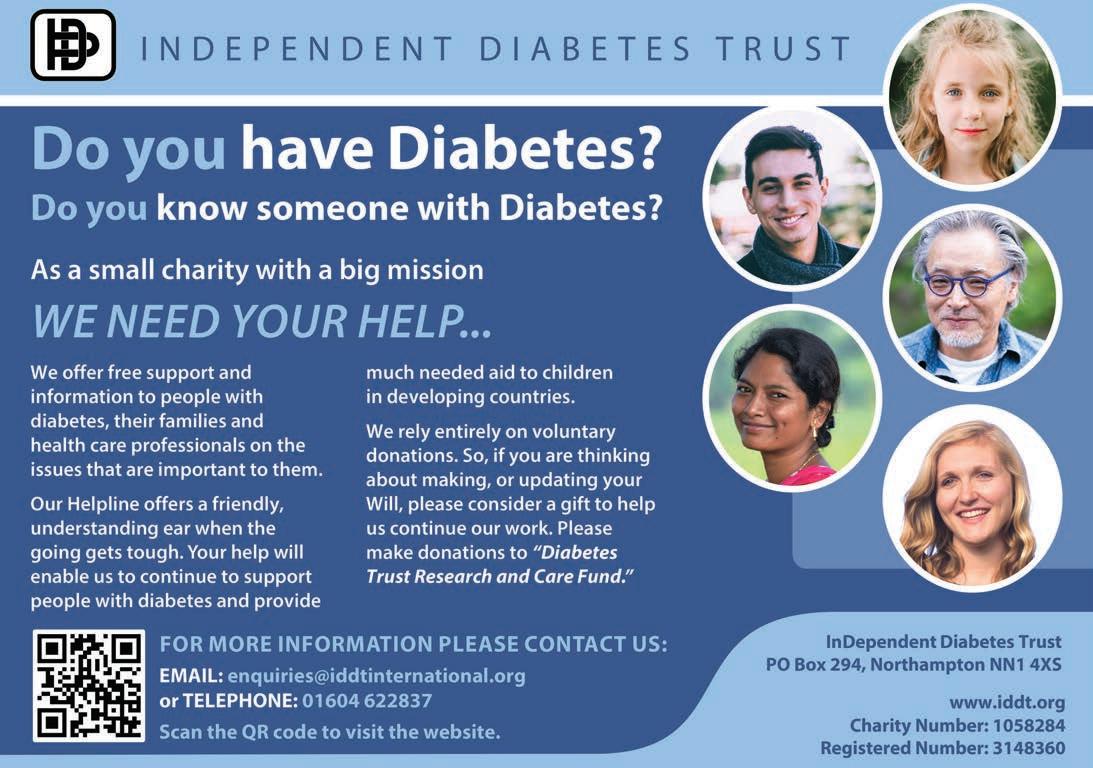





Now that the hysteria and foreboding over changes to IHT have settled down, a clearer picture has emerged of the likely effect of the changes on the legacy market.
In general, it seems, the result has been to prompt those who may fall into the scope of IHT to seek advice. Indeed, more than half of advisers interviewed for a survey have already seen an increase in demand for advice.
Most advisers – around two thirds – think that more people will consider leaving a gift in their wills to a charity.
• The influence of government action on charities is a common thread running through this issue. Still on the subject of legacies, proposals for a new Wills Act are currently under scrutiny by government.
The idea is to make creating a will more accessible to today’s generations and more relevant to those same generations. Among the reforms under consideration is the validation of electronic wills, the age at which a will can be made and a reform of the capacity test.
• In the wider charity sphere, two government proposals will have a bearing. The second iteration of the National Strategy for Philanthropy has been published. The ambition is to see 2% of GDP being





donated to charity in the next 10 years.
Building philanthropy into the commercial sector as well as individuals requires a co-ordinated effort on the part of government and charities, and the strategy aims to set that effort in motion.
• At the same time the government has been consulting on the rules regarding public procurement from charities. Charities supply a surprising £14bn worth of public services each year – principally to the NHS and local authorities. The resultant changes could provide opportunities or threats to charities.
• Implementing new rules is the subject of a further pair of guidance documents.
The Fundraising Regulator has published guidance for individuals and organisations regarding face-toface fundraising. As well as setting out protection of the public, the guidance lays down protections for fundraisers themselves.
Now that the Data (Use and Access) Act has come into force, guidance is now available – also from the Fundraising Regulator – on the use of the so-called ‘soft opt-in’ process. Again, the aim is to protect customers or, in the case of charities, donors, from data misuse.

www.magprint.co.uk

The photograph on the right of border collie Nipper was taken on the same day that he’d been taken to a vet’s to be put to sleep. Purchased as a ‘surprise’ gift, he was unwanted. This beautiful puppy was just eight weeks old and is just one of almost 10,000 animals rescued by Friends of the Animals.
There was a happy ending as –now renamed Stanley – he was rehomed with one of the charity’s voluntary drivers, who adores him.

Friends of the Animals began in March 1990 and had very humble beginnings. Veterinary treatment is invariably the charity’s biggest outgoing and to date they have spayed or neutered 45,000 animals. Thousands more have been wormed and inoculated – often for the first time in their lives!

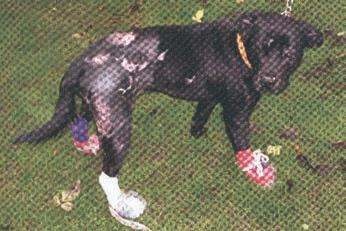
Founder Helen Sinclair MBE, who was honoured for Services to Animal Welfare in 2014, takes up the story: “There have been many memorable cases, where we’ve saved animals’ lives against all the odds. Animals such as the puppy who slipped under the railings of a balcony – luckily bouncing off the conservatory roof which broke her fall. Then there was the dog who fell down a manhole in the road after someone had removed the cover, and poor Marshall, who had three broken legs and a severed ear.
“Susie, a Labrador/Staffy cross (pictured above), was badly burnt in a house fire, but made a good recovery; and the dear little cat above had everything wrong with him, but survived and thrived.
“When 11 month old Border Collie ‘J.J.’ came into our care, she had a pin / plate poking through
a badly infected front leg, a paw so badly crushed the bones had fused together and a stab wound.
“Her original owner pleaded guilty to causing unnecessary suffering to a protected animal and was fined £2,000 and banned from keeping an animal for ten years.
“As you can see from the wonderful photo below, ‘J.J.’ went on to much better things.”
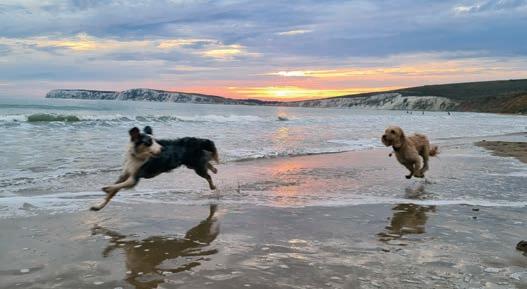
Gifts in wills fund one in two veterinary treatments and so legacies are an absolute lifeline to the rescue and spaying/neutering work carried out by Friends of the Animals.
The charity has a policy of non-destruction, unless an animal is sick or injured with no hope of recovery, and they keep admin costs to a minimum. Very importantly, 90% of their staff are volunteers, which ensures as much of your gift as possible is spent on saving animals.
Pitted against that constant battle to save lives was the action of the person who set fire to the front of the Charity’s base.
“But, happily,” said Helen, “we're a resilient team and together with the help of supporters, we barely skipped a beat and just kept on going.

“We truly appreciate that people have many choices regarding charities to support, but no one appreciates it more, or tries harder than we do, to get the very best possible use from every penny donated. Thank you for your consideration.”

[IN THE 2024 AUTUMN STATEMENT the Chancellor announced that Inheritance Tax (IHT) thresholds would remain frozen until 2030 and that pension wealth would no longer be exempt from IHT from April 2027, with restrictions on agricultural and business property reliefs from 2026.
As such, it’s estimated that the proportion of estates facing an IHT bill will almost double by 2030. That increases the scope for estates to benefit from charitable gift exemptions and the reduced rate of IHT, at 36%, which applies to estates where 10% or more of net value is donated to charity.
The latest findings from a Professional Adviser Tracking Study carried out by Remember A Charity show that upcoming IHT changes are already beginning to influence the charitable will-writing market, with professional advisers reporting an increase in demand for estate planning advice and predicting that legacy consideration will rise.
Key findings from the study show that:
• 92% of professional advisers believe that estate and tax planning will become even more important following the IHT changes announced in the 2024 Autumn Statement
• 60% say they are already receiving more requests for advice
• 65% say that the charitable tax incentives will become even more important to their client base
• 62% think more people will consider leaving a gift to charity.
Tanya Watson, chartered tax adviser and senior director of Alvarez & Marsal Tax LLP, explained: “The changes to IHT are prompting a fundamental reassessment of estate planning strategies, particularly among clients who may not have previously been impacted. What we’re seeing is a growing need for tailored advice that balances financial objectives with personal values.
“Charitable giving can be a highly-effective planning tool, and these changes provide a timely reason for advisers to revisit legacy plans with clients who may not have considered this route before.”
When it comes to will-writing, 77% of solicitors and will-writers now say they always or sometimes proactively raise the charitable option with clients – up from 72% in 2023. Charitable gifts are becoming more prevalent over time, with an average of 21% of wills written through a solicitor or will-writer now including a donation. That rises to 24% among those who always reference charitable legacies with clients and falls to 14% of those who never do.
Tax incentives are the most prevalent reason advisers give for raising the topic of legacy giving with clients: 92% of solicitors and
[ HYPO HOUNDS provide a viable health care alternative for children and their families by training a Diabetic Alert Dog to detect the subtle changes in the child’s blood sugar levels.
The dogs are trained to alert parents when the child’s sugar levels drop dangerously low or rise too high. This not only impacts on the child but also on the family’s ability to function as a unit, with the registered carer becoming the dog.

will-writers and 86% of financial advisers in the study say they always or sometimes advise their will-writing clients of the charitable tax incentives.
Lucinda Frostick, director of Remember A Charity, said: “Professional advisers can have a profound impact on clients’ decision-making. While talking philanthropy isn’t always their comfort zone, fiscal incentives are – forming a natural starting point for approaching charitable giving.
“Even though the reasons for giving extend far beyond tax incentives, these IHT changes make the legacy conversation more relevant to a wider group. They present an ideal opportunity for advisers to raise the topic, building understanding of legacy giving and inspiring more clients to support the causes they care about.”
Eleanor Evans TEP, partner for trusts and estates administration at Hugh James, echoed the industry view: “We’re already seeing an increase in clients seeking early advice on estate planning. Many people choose to leave legacies to benefit a cause they care about, and the tax breaks for gifts to charity provide an added incentive.
“As more estates will become liable for IHT once the changes take effect, charitable giving is becoming an increasingly important part of the estate planning conversation.” q
• The Remember A Charity annual benchmarking study is carried out by Savanta. The 2024/25 edition is based on in-depth telephone interviews with 237 solicitors, professional will-writers and independent financial advisers across the UK. The research was carried out between November 2024 and February 2025

Hypo Hounds work is becoming nationally recognised and is literally saving the lives of children – one sniff at a time. q



[JAMES STEBBINGS, the chair of the Institute of Legacy Management, gave a 15-minute TED talk on the topic Why Can’t We Be Friends at the TWP Festival – organised by Today’s Will and Probate – on 25 June. The title was borrowed from a song by American funk band War.
Speaking afterwards, James said: “We were delighted to be asked to participate in the festival and address this issue. It is so important that the legal profession feel kindly towards charities and building better relationships with them is one of our key organisational goals.
“It is only by engaging with them that they can understand more what legacy managers need from them and why they need it.”
James talked about the critical role of charities to UK society, the importance of charity giving to funding charities and the solicitors’ role in influencing their clients to think about legacies – noting that research has shown charitable legacy giving increased by 40% when ‘normalised’ by solicitors.
He touched upon the duties of trustees and the need for legacy officers to ensure that gifts are administered properly, explaining: “It was
important to say to solicitors and professional executors we recognise that sometimes having your work ‘overseen’ is frustrating, but we hope that generally charities give great experiences and, if we are occasionally annoying, to encourage them to think of the big picture and the huge positive impact that charitable gifts in wills deliver.”
Joining James at the event were fellow ILM board members Paul Browne, Blerta Clubb, Fiona Webster, Becky Massey and Dave Hawes.
The following day James and Fiona hotfooted it to Chester, to attend an event organised by STEP Cheshire and Stephen Lawson, who is chair of the Law Society’s Wills and Probate Committee.
James and Fiona were joined by ILM member and CRUK Legacy Partnership manager James Taylor, together with Henry Straw of IDR Law, to deliver a 90-minute open forum, listening and responding to feedback on the way charities administer legacies.
Fiona commented: “I spoke about the relationship between charity legacy teams and professional executors, emphasising that a lot of us have done their job; we really do understand
[BIRMINGHAM DOGS HOME is a charity that has been serving the West Midlands community for over 130 years since it was founded in 1892, and they have always provided homeless dogs with a refuge and a place to feel safe. From humble beginnings it is now proud to be the largest dog rescue charity in the region, operating from two rescue centres.
The charity’s gifts in wills and in-memory officer Jilly Winstone said: “We care for over 2,000 homeless dogs every year, and our vision is for every dog to be cared for with kindness and empathy, so that they can lead a happy, fulfilled life, feeling safe and loved.
“We believe that every dog matters, which is why our teams work tirelessly, every day, to relieve suffering and help every dog we can, whilst providing medical care, emotional support and training as well as food, shelter and love. Most of the dogs we care for have been abandoned and come to us as strays through local authorities.
“Birmingham Dogs Home do not receive any government funding and rely solely on the generosity and kindness of the community we serve.
“We are very proud of all we have achieved, but are only able to continue providing these life-changing and life-saving services thanks to the very special people who kindly remember us in their wills, as a cause close to their heart.
“We have now also launched our Forever Friends service which can provide you with the reassurance that our charity can continue to care for your dog in the event of your passing. This is a free service and many supporters who sign up also choose to leave a gift in their will to Birmingham Dogs Home.
“Every dog matters – thank you for helping to make the world a better place for them.” q

the pressures they face and it is never our intention to add to them.
“We appreciate all that they do and, when we ask for more information or suggest an action such as appropriation, we do so purely in the best interests of the estate and to maximise our legacy; not to cause them more work or be pedantic.
“We understand that our suggestions may sometimes be unwelcome and we apologise –my overarching take-away was ‘we get it’ and ‘bear with us’ – and if we can improve, please let us know. The panel took questions and engaged in a very energetic and productive discussion on topics such as how to make our first letters better, the value of a group of charity beneficiaries having a lead, and how often we chase them for updates, amongst others.
“Opening up the dialogue between two sets of professionals who very rarely get the opportunity to mingle was very useful and the feedback from STEP was overwhelmingly positive, so we hope to go ‘on tour’ again soon.” q

• Please be a part of our future by remembering us in your will today. Visit birminghamdogshome.org.uk/support-us/leave-a-gift-in-your-will/

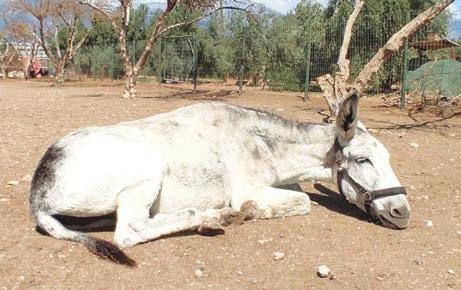
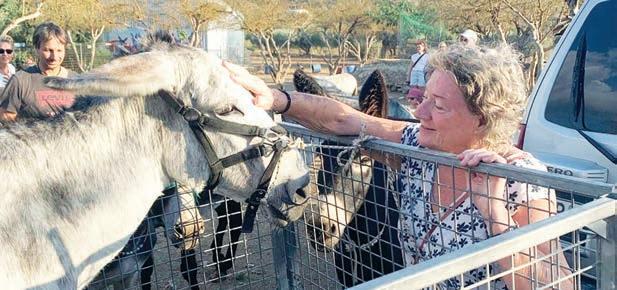
[FOR OVER 60 YEARS, Animal Action Greece has been a lifeline for thousands of animals across the country. Every day, we rescue, treat and protect Greece’s most vulnerable animals, including street cats struggling to survive, abandoned dogs, and working donkeys, mules, and horses suffering from neglect and overwork.
Many animals, like Dorothèa the donkey (pictured above), face unimaginable challenges.
Dorothèa, whose name in Greek means ‘gift from God’, has been through more than most of us can imagine. This resilient donkey once worked tirelessly transporting tourists in a gorge. But when she was no longer wanted, she was handed off to a hoarder, where she suffered neglect and maltreatment. Later, she was used and then abandoned by an American film crew after filming a movie.
Her journey has been incredibly tough, but we are happy to share that Dorothèa was rescued and now lives in a donkey sanctuary in Crete, where she is finally safe and able to live out the rest of her days.
But our work is never done. The challenges animals face don’t disappear overnight, and without support, many will continue to suffer.
That’s why leaving a gift in your will is one of the most powerful ways to ensure that our vital work carries on long into the future.
By choosing to leave a legacy, you can help us:
• Provide urgent veterinary care to stray animals who have no one
• else to turn to.
• Support community neutering programmes, preventing thousands
• of unwanted kittens and puppies from being born into hardship on
• the streets.
• Ensure that donkeys, horses and mules receive the farriery, dental
• and veterinary care they need to live free from pain.
• Respond to emergencies, offering lifesaving treatment and shelter
• to animals affected by disasters such as floods and forest fires.
Every gift, no matter the size, has the power to change lives.
Your kindness today can shape a better tomorrow – one where no animal is left to suffer alone.
Will you help us create a future where every animal gets the care they deserve? Please contact us via the details below to find out more. q

[IN JULY Legacy Futures hosted a compelling webinar: shining a light on the most recent learnings from In-Memory Insight.
Over the past years the programme has explored a wide range of themes, including the digital transformation of in-memory giving, the importance of collective remembrance, the development of innovative in-memory products and, most recently, how in-memory giving resonates within multicultural Britain.
This year’s programme will deep dive into the world of tribute funds. This practical programme will explore the key opportunities and challenges surrounding tribute funds. It will explore the positioning of tribute funds, what it takes to make them successful and the different stakeholder relationships that impact on their success

Whether a charity is looking to establish a tribute fund programme or take their existing approach to the next level, the programme will equip them with the insights, tools and evidence to do so.
According to the introduction to the programme, published in June: “Tribute funds are an increasingly important part of the in-memory fundraising landscape. They can be used in so many ways and offer something for everyone. For bereaved families and friends, they are
happy places of remembrance and offer a personal, lasting way to honour loved ones while supporting causes that mattered to them. For charities, they present a unique opportunity to build deeper, more meaningful relationships with supporters and to grow sustainable income streams rooted in loyalty and emotional connection.
“Despite their potential, tribute funds and their associated supporter journeys remain underdeveloped in many organisations. Fundraisers tell us they want clearer insight into what makes tribute funds succeed, how to identify and nurture supporters who could become long-term tribute fund holders, and how to align internal processes to support this specialist area of giving.
“This year’s In-Memory Insight programme is designed to meet that need. Through a combination of research, learning from best practice and benchmarking, we will explore how tribute funds are currently being used and how they could be developed further.
“We’ll look at the dynamics between families, funeral directors and charities, and provide practical recommendations to help teams across your organisation engage more confidently with tribute funds.” q

[THE UK’S MEDICAL ROYAL COLLEGES play a pivotal role in safeguarding the standards of healthcare – and the Royal College of Surgeons of England (RCS England) is our cornerstone of surgical excellence.
Established by Royal Charter in 1800 and growing to become an international membership organisation, RCS England has evolved into the central authority in surgical education, training and professional development.
Setting rigorous standards for surgical practice and accredited training programmes, the college advises government and healthcare institutions on clinical effectiveness – always and only focused on advancing good surgical outcomes for patients, their health and their quality of life.
For legal professionals navigating clinical negligence, personal injury or regulatory cases, understanding the role of RCS England offers valuable insight into a vast range of activity underpinned by care for the patient.

RCS England’s fundraising team said: “For many supporters of RCS England, their appreciation of our work takes the shape of a legacy or in-memory gift, and every year, an extraordinary range of our work is made possible by this generosity. With a tried-and-trusted record of working with pledgers to understand and guarantee their wishes, and showing our appreciation, the college is a safe pair of hands for any size of gift and every personal interest.”
Even the cultural heritage of RCS England has been strengthened by pledgers’ generosity. The oldest painting in the college’s collections is King Henry VIII and the Barber Surgeons (pictured), attributed to the studio of
Hans Holbein the Younger. This 1541 group portrait commemorates the union of the Barbers and Surgeons, with Henry VIII presenting a charter to Thomas Vicary, the first Master of the Company. The college’s version is a preparatory cartoon for the final painting, confirmed by radiographic evidence revealing transfer marks beneath the surface.
The work features prominent royal physicians and surgeons, set against a backdrop of Tudor London. Professor Bertram Cohen CBE’s research authenticated its provenance, and his legacy gift ensures its preservation. Returned to public display in 2022, the painting is a reminder of the intertwined histories of visionary scientists and their patrons. q
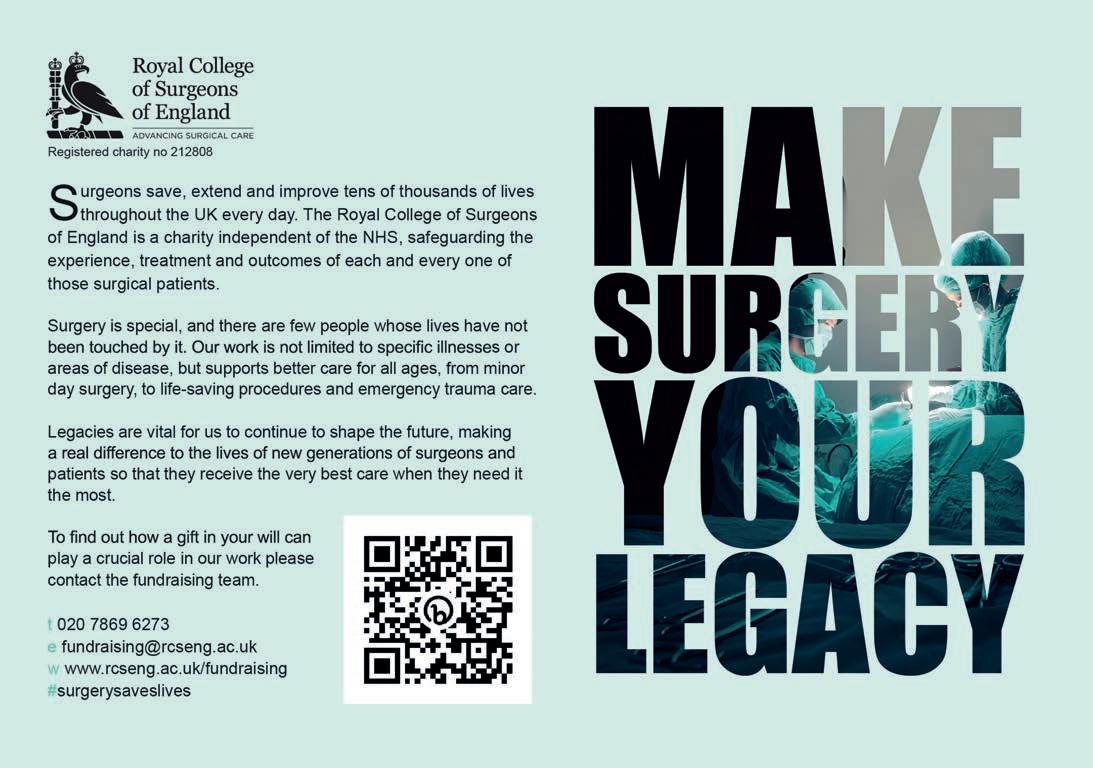
[ON 16 MAY 2025, the Law Commission released the draft Bill for a new Wills Act, proposing significant reforms to modernise the law governing wills in England and Wales. The recommendations aim to make will-making more accessible and reflective of contemporary society. The draft legislation now sits with government to confirm what proposals will be implemented.
Publishing its proposals, the Law Commission pointed out that the law governing wills largely dates from the Victorian era. It has not been comprehensively reviewed for nearly 200 years, and the report makes recommendations to clarify the law and to ensure it is fit for purpose in the modern age.
Given the potential impact of the reforms on legacy giving – a vital income stream for many charities – it is crucial for organisations across the sector to be aware of and consider the implications of likely changes. Understanding the proposed legislation will help ensure that charities can continue to plan sustainably and ensure fundraising strategies reflect the changing landscape for charitable wills.
Professor Nick Hopkins, Commissioner for Property, Family and Trust Law, commented: “Wills law is important as it can potentially affect everyone. Many people will make a will, and many others may benefit from someone else’s will. Wills are also a significant source of charitable funds, with many charities receiving a large portion of their funding from legacies left to them. Our recommendations will modernise wills law to promote testamentary freedom, bringing with them greater certainty, clarity and fairness.”
Two organisations that contributed jointly to the Law Commission's supplementary consultation were Remember A Charity and the Institute of Legacy Management (ILM), advocating for the interests of the charity sector.
Vice chair of Remember A Charity and director of fundraising at The Duke of Edinburgh’s Award, Alex McDowell, said: “We welcome the ambition behind these proposed reforms to modernise wills law, particularly when it comes to making it easier for people to leave gifts to the causes they care about, so long as the appropriate safeguards are put in place.
“This is a complex area of law, and it will take time to fully understand the implications for charities and legacy giving. We are committed to working with government, legal experts and the wider charity sector to explore what this means in practice and to ensure the voice of the sector continues to be heard.”
The proposed changes include:
• Validating electronic wills, subject to certain protection measures and safeguards

[FAILING EYESIGHT is nothing short of a personal catastrophe. Do you have a family member, friend or neighbour who is gradually losing their sight?
Reading, recognising friends and living skills are all affected as your sight is going – and it’s much harder if you live alone.
The National Federation of the Blind of the UK (NFBUK) keeps its members in touch with general information, help and updates on what’s going on.
The charity produces bi-monthly news magazines and circulars in audio, braille or electronically, which members can read independently. It also encourages blind and partially sighted people to play a fuller part in society. q
• For further information contact NFBUK on 01924 291313, email admin@nfbuk.org or visit www.nfbuk.org
• Abolishing the law that revokes a person’s will when they marry or enter a civil partnership, reducing the risk of predatory marriage
• Lowering the minimum age at which a person can make a will from 18 to 16
• Clarifying that the requirements for mental capacity will be based on the modern test in the Mental Capacity Act 2005
• Making it easier for a person's wishes to be granted when a will does not comply with formality requirements but their intentions are clear
• Increasing protection for those coerced into making a will James Stebbings, chair of the ILM, commented: “We welcome the Law Commission’s proposals, which we believe will help ensure that people’s final wishes will be upheld by the law. The report is ambitious and boldly addresses the concerns that the charity sector has had with the existing legislation. There is a lot to digest but we will work with our members to identify what the implications of the changes will be and to help them adapt to these.”
Alex McDowell added: “While these are only proposals at this stage and it's over to government to decide what legislation will be taken forward, this is a key moment in the evolution of the environment for charitable wills. Legacy giving is a vital income stream for charitable organisations across the UK and it is essential that we have robust and relevant rules in place to protect the public and enable philanthropy.” q

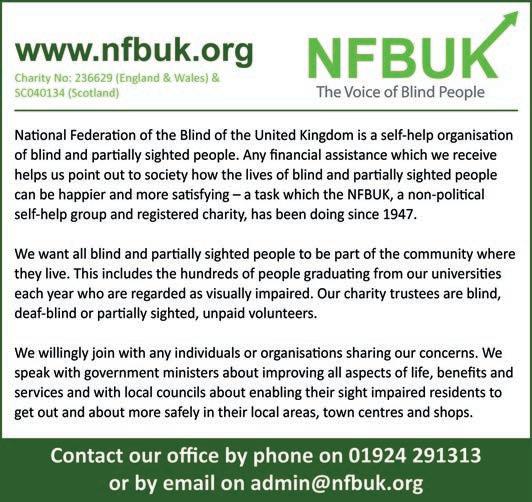
[
PROMOTING AND ASSISTING in access to justice in the Family Court is the aim of Parenting Together, a charity set up by former youth worker Gerry Hannah.
Gerry points out suicide is the most common cause of death among young people – often prompted by the depression caused by family break-up. He believes that in many cases the break-up of the family is avoidable if parents are able to present their version of events.
Said Gerry: “British Family Courts sit in private and they convict parents merely on the ‘balance of probability’. In some cases a judge is persuaded to make a misinformed decision based on race, gender, heritage, beliefs and social status – often causing serious depression which can have lethal consequences.”
Gerry formed his association with humanitarian experts and professionals to ensure low-income, disadvantaged parents involved with social services or Family Court proceedings receive fair and equal justice.

He added: “We mostly provide specialist legal services, advocacy and reports for disadvantaged parents in Family Court proceedings. Our experts, professionals and associate solicitors often work pro bono to help us resolve exploitation and unlawful abuse of the family
law and child protection systems. We framed our projects on the government’s Every Child Matters report, published in 2003, that recommended engaging families in the care and protection of children.”
He points to cases of parents with learning difficulties asking people on social media for advice when they cannot understand the legalese, acronyms and procedures.
“They are usually misguided, posting views and comments that go against them in court. Their social media ‘friends’ are often predators who exploit single parents with young children. We recently submitted evidence to the CPS against a few of these sexual predators targeting our vulnerable parents and their children.”
The current project is a continuation of Honeypot Families, a work-in-progress study comparing families in the safest happiest regions of the UK with families in what Gerry describes as ‘the most dangerous city in Europe’.
“We concluded that Judeo-Christian families functioned efficiently to provide the best outcomes for everyone because they are based on a mutually agreed contract where adults vow to love, care and respect each other until death.” q

[ THIS YEAR’S Remember A Charity Week ran from 8-14 September –and this year one of its features will continue until the beginning of October.
Remember A Charity Week is an opportunity for everyone to take a moment to consider leaving a gift to charity in their will, after looking after family and friends. Every year has a theme, and this year the theme was to celebrate the funny moments, interesting hobbies and unique quirks that we remember and cherish about our loved ones.
Everyone was encouraged to think about how they'd like to be remembered. It could be a funny moment, a unique hobby – or even their legendary dance moves at the local disco night.
There’s Jackie, whose wonky home haircuts are legendary, Uncle Geoff (pictured), whose gnomes are where his heart is, or Owen, whose hips haven’t stopped since 1972. But they can also be remembered even more: by leaving a gift in a will to their favourite charity.
Through its partnership with The National Will Register, Remember A Charity Week offers people across the UK the opportunity to register their will free of charge – not only during the week from 8-14 September but right up until 3 October.
The National Will Register is the UK’s leading will registration and will search service, with over 10.5 million wills currently recorded. Registering a will ensures that it can be located quickly and confidentially when required, helping to safeguard people’s final wishes.
By registering their will, donors can provide reassurance to their family and friends, and help prevent the important document from going missing or remaining undiscovered – therefore ensuring that their legacy, and gifts for loved ones or charities alike, are protected.
A dedicated code has been created for free will registration through the National Will Register website. The code, RACWeek2025, will remain active until 3 October. q
[KIDNEY KIDS SCOTLAND, a very small charity with a huge heart, has for the last 25 years supported Scottish children with renal and urology conditions. The main aim of the charity has always been to enable these children to receive treatment as close to home as possible and minimise disruption to the family unit.
In addition the charity helps hospitals all over Scotland, supplying them with much needed equipment and funding posts recognised as being essential. Chronic Kidney disease is a condition that has no cure and that children and their families must learn to live with.
IMAGINE your child only being able to drink 400mls in one day. That’s less than two cartons of juice – a can of juice is 500mls.
IMAGINE being a parent where you must be home before 8pm every single night to ensure your child gets their daily home dialysis.
IMAGINE not being able to take your family abroad or too far away from the hospital because your child cannot go without their dialysis. This HAS to happen in hospital 3 or 4 times EVERY week.
IMAGINE your child missing out on school education, social activities, family members’ birthday celebrations, a sibling’s sports day or a family wedding because you need to make sure they receive their life saving dialysis treatment.
IMAGINE your child spending their birthday and/or Christmas Day in hospital and not being able to see their friends from week to week. q
IMAGINE LIVING WITH KIDNEY DISEASE
For more information about Kidney Kids Scotland please visit our website at www.kidneykids.org.uk, call 01324 555843 or email office@kidneykids.org.uk
Kidney Kids Scotland can help in many ways
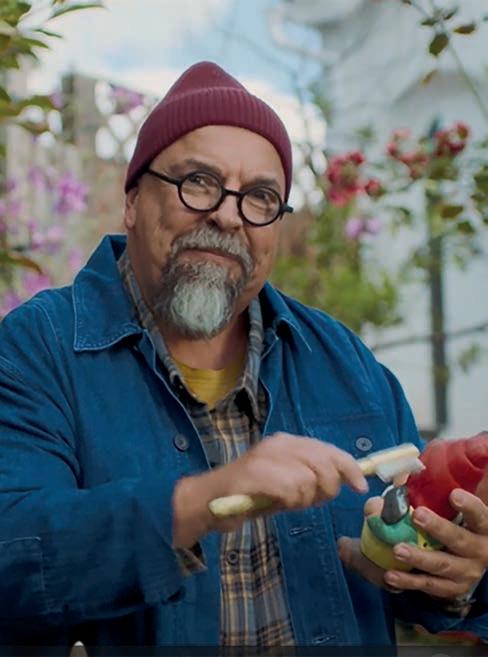
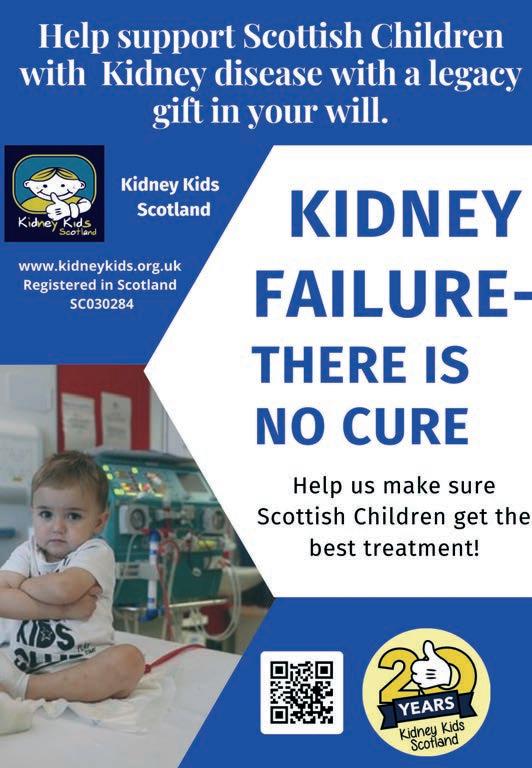
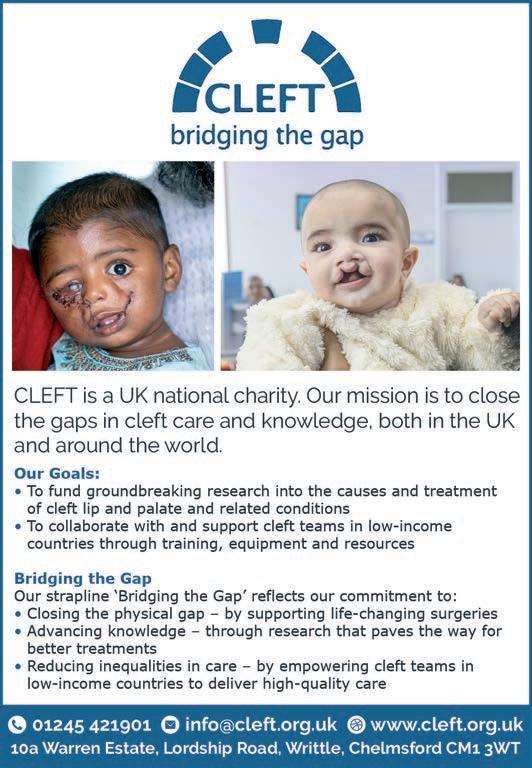

[EVERY DAY IN THE UK, one in 700 babies is born with a cleft lip and palate – the most common birth anomaly.
This condition can profoundly impact a child’s appearance, speech, hearing and dental development, often leaving lasting psychological scars.
In many developing countries, cleft surgeries are delayed – or never happen – leaving children malnourished, struggling to communicate and facing social exclusion.

At CLEFT we dream of a future where clefts are preventable. Until then, we are dedicated to improving lives – both in the UK and around the world.
Support groundbreaking research
By funding pioneering research, we’re uncovering the causes of clefts and developing kinder, more effective treatments for children everywhere.
Expand global cleft care
We work to establish cleft centres in low and middle-income countries, ensuring children there have the same opportunities as those in the UK. q
Every donation brings us closer to transforming countless lives. Leave a legacy of hope and healing.
[ZANE: ZIMBABWE A NATIONAL EMERGENCY is a UK registered charity working to help the most destitute, vulnerable and impoverished people in Zimbabwe. It is the largest supplier of financial aid to elderly people in Zimbabwe who lost their life savings and pensions in the economic collapse and subsequent hyper-inflation.
This includes over 440 frail veterans and their widows who fought for the Crown. ZANE assists with rent, medical bills and food –and, crucially, also provides comfort, advice and support.
In addition, ZANE funds a clubfoot correction programme, successfully treating over 6,600 children to date. ZANE also funds education programmes including the provision of pop-up classrooms in a high-density township for children who would otherwise not receive an education. It runs creative therapy workshops for women living in extreme poverty who are victims of political violence and trauma.

Zimbabwe remains a country in crisis. With some of the highest inflation and unemployment rates in the world, Zimbabwe’s economy teeters on the brink of collapse. Coupled with a woefully inadequate healthcare system, the need for ZANE is greater than ever for the most destitute people in Zimbabwe. q
[NEW RESEARCH REVEALS the prevalence of charitable legacies among high net worth individuals, highlighting the opportunity for further growth.
The study, commissioned by Remember A Charity and conducted by independent research firm Savanta, surveyed 500 people with over £1m in investable assets. It reveals that half (50%) of millionaires have already included a charitable gift in their will, rising to 75% for those with estates of over £5m.
Noting that legacy giving among high net worth individuals may extend beyond a simple donation in a will, the research finds that nearly one third of the group (32%) have established a Charitable Will Trust, and three in 10 (28%) used a Donor Advised Fund.

Among those millionaires who have not included a charitable legacy in their estate plans, the large majority (58%) say they are open to doing so and 26% said that they simply hadn’t thought about it before. That highlights the opportunity to engage that particular audience at the will-planning stage.
Percentage gifts
Although only around one quarter of millionaires (26%) say they have prepared to leave a percentage of their estate to charity – rather than a fixed sum – many more (40%) say they would be willing to donate a share of their estate. With market studies showing that around 90% of legacy income comes from residuary gifts and that high-value estates are driving up legacy values, it demonstrates the importance and potential impact of increasing percentage gifts in that market.
Family dynamics and intestacy
In contrast to mass market trends – where child-free individuals are twice as likely as those with children to leave a charitable gift – this
study finds that, for high net worth individuals gifts in wills are more prevalent for those who do have children (50%) than for those who don’t (42%). It indicates that, at that level of wealth, individuals may well recognise they are able to both secure their family’s future and provide support for charitable causes. It may also reflect the fact that intestacy tends to be higher amongst those without dependents, with one in five saying they don’t have a will and have no plans to write one.
The research showed a surprising lack of up-to-date wills among a demographic that is likely to leave considerable wealth to the next generation. Only 31% of millionaires have an up-to-date will, and over one third (35%) of those aged 55-65 don’t have a will at all. One quarter of the millionaires in the study say they are in the process of writing or updating their will, reinforcing the opportunity to integrate charitable giving into estate planning.
There are generous tax incentives in the UK for those who leave a charitable gift from their estate. Donations are tax-free and if 10% or more of the net value of the estate is donated this can reduce the Inheritance Tax rate from 40% to 36%. q

[PAWS2RESCUE has a simple mission: to help animals in need, wherever they are. Because the charity is entirely run by volunteers, every penny raised helps them continue this important work. If you'd like to help create a kinder world for all creatures, remembering Paws2Rescue in your will means you’ll be helping to ease the suffering of animals for many years to come.
The charity’s Alison Standbridge said: “Even though we’re based in the UK, we know that so many animals overseas face terrible neglect and cruelty. That’s why, along with finding loving homes for over 7,000 unwanted dogs and cats in the UK, we also run international projects to help reduce animal suffering, especially in places like Romania, Moldova, Ukraine and Peru where animals often endure awful conditions.
“Our goal is to ease the daily struggles these animals face by providing food, medical care and shelter. We also support rural shelters that really need help in areas where resources are limited and we’ve built our own sanctuary, to ensure traumatised animals can find peace, and set up our own vet clinics in areas where medical treatment was previously unavailable.”
But unlike charities that simply rehome, their mission is to truly end this suffering. That’s why Paws2Rescue offers free neutering for stray and owned animals, helping to prevent unwanted puppies and kittens and encouraging owners to look after their pets’ health.
To date, the charity has spayed an incredible 18,000 animals. Assuming each animal would have twelve puppies a year, that has prevented well over two million unwanted animals being born since their inception in 2013! So, while being focused on helping animals in need wherever they can right now, their dream is to create a world where there simply are no more unwanted animals.
Alison added: “Education is a big part of our mission. If young people grow up with the same old attitudes that allow cruelty to
continue, nothing will change. Our schools programme helps break this cycle by teaching children to love and respect all living creatures. Plus our veterinary scholarship programme helps young students in Romania by funding their qualification, so more vets are available to work in rural areas where animals need the most care.
“If you choose to leave a gift to Paws2Rescue, no matter how small, you can be sure that every penny will go towards helping dogs, cats and other animals in need, both now and in the future. Thank you.” q


[ THE CHARITY COMMISSION has concluded its inquiry into the Organisation of Blind Africans & Caribbeans (OBAC), finding four trustees responsible for serious failings.
The charity was set up to support blind and partially sighted members of African and Caribbean communities and provide services which included immigration advice, education and training.
An official inquiry report, published on 28 August, found that four trustees of the charity had not sufficiently overseen the actions of the charity’s CEO, Ibukun Olashore – including by allowing her to continue acting as CEO following a serious conviction.
The lack of action by the trustees enabled the CEO to have sole access to charity funds and use the charity to offer immigration advice illegally. As a result, the regulator has disqualified four trustees.
The commission has now removed the charity from its public register after it was struck off by Companies House.
Background
In March 2021 the charity’s CEO was charged with serious criminal offences. In April 2022, she was convicted of conspiracy to do an act to facilitate the commission of a breach of UK immigration law by a non-UK
national and of conspiracy to possess/control identity documents with intent. As such, she was automatically disqualified from being a charity trustee or holding a position with senior management functions within a charity.
At her sentencing, the judge concluded that the CEO used the charity ‘as a front’ and was using OBAC as a front to conceal her criminal activities and exploit vulnerable individuals for financial gain.
The regulator opened an inquiry after the trustees repeatedly failed to respond to requests for information, including a formal direction to submit information by legal order. It also had suspicions that the CEO remained at the charity despite her conviction.
In its report the Charity Commission listed a series of failures, even including subletting its offices, which was in breach of its tenancy agreement. When questioned, the trustees had no knowledge of the lease terms or who one of the subletters was.
Even after being made aware of the CEO’s convictions for serious criminal offences, the trustees failed to take any steps to address the matter, such as suspending the CEO and carrying out an internal investigation.
The commission found that all of the failures amounted to serious misconduct and/or mismanagement in the administration,
[ESTABLISHED IN 2001, the Suffolk Owl Sanctuary – known affectionately as S.O.S. – operates a comprehensive facility for the rescue, care and rehabilitation of owls and other birds of prey across East Anglia. It also promotes the need for the conservation of threatened raptor species throughout the UK with its Saving Britain's Owls initiative.
The S.O.S. Raptor Hospital at Stonham Aspal is unique in the region. It is specially equipped for the care and treatment of the many injured wild owls and other birds of prey it receives every year as a result of road traffic accidents, mishaps, starvation, trauma, disease, poisoning and sometimes even shooting or trapping.
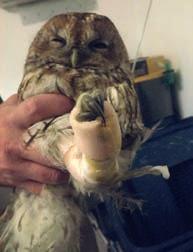
Many of the birds can be given a recuperative, short-term pick-meup before being re-released into the wild, whilst those that are more seriously injured but stand a chance of recovery are given medical aid and/or surgery, as determined by their vet.
The birds are then allowed space and time to fully recuperate in one of the secluded recovery aviaries before being carefully returned to the wild.
S.O.S. operates a wild owl nest box scheme that includes building, locating, curating and repairing environmentally friendly nest boxes in appropriate locations to replace the gradual erosion of natural nesting sites.
S.O.S. is funded purely by donations and, as a small charity, the legacies it receives play an important role in enabling it to sustain the resources needed to actively promote the conservation of owls and other birds of prey throughout the UK. q
governance and management of the charity. The report, which contains the full findings, is available on gov.uk
The regulator gave the trustees the opportunity to remedy their failings by issuing the charity a Regulatory Action Plan, but the trustees failed to act. As a result, the commission has disqualified the four most recently serving trustees. Ruth Bishop, Diib Jama and Rasheed Bello have been disqualified for five years. Dwight Watson has been disqualified for three years. The charity’s CEO is automatically disqualified indefinitely.
Amy Spiller, head of investigations at the Charity Commission, said: “We expect anyone running a charity to do so honestly, and with integrity. To use a charity as a cover for criminal activity is wholly unacceptable and an abuse of trust. By allowing this to continue, the charity’s trustees have also abused the trust placed in them and failed to uphold their legal duties.
“The commission will always take robust action if a charity is misused. We do this to prevent further harm and ensure that trust in the wider sector is protected. It was proportionate in this case to disqualify four trustees, all of whom failed to meaningfully engage with our inquiry.” q




[THE FUNDRAISING REGULATOR has published information on what charities should know about the new rules for charity direct marketing after the Data (Use and Access) Act received Royal Assent on 19 June.
When the relevant part of the Act commences, charities will be able to send direct marketing using electronic mail (emails, texts and social media messages) to people who either express an interest in or offer to provide support to their charity, without needing the person’s consent first. The UK Government will phase in the implementation of the Data (Use and Access) Act meaning ‘soft opt-in’ for charities cannot be used until that part of the Act commences, which will potentially happen in the coming months.
This so-called ‘soft-opt in’ option is expected to benefit charities by enabling more contact with supporters, and therefore potentially more fundraising opportunities. It will only apply to direct marketing using electronic mail – not telephone marketing – and rely on the ‘legitimate interest’ lawful basis for processing personal data under the UK GDPR.
It will not be possible for charities to offer the opt-out to people already on their database as it cannot be applied retrospectively. One of the requirements for ‘soft opt-in’ includes providing people with an opportunity to opt-out at the time that their personal data is first collected. In order to use ‘soft opt-in', all the legal requirements for charity 'soft opt-in' will need to be met.
Although ‘soft opt-in' for charities hasn’t yet started, now is a good time to start planning ahead, the regulator says. Charities are encouraged to use the coming months to think about whether ‘soft optin’ is right for them, and if so, they should start to prepare by:
• Reviewing their existing electronic mail marketing processes and
• making sure they can accurately record a person’s marketing
• preferences
• Carrying out a legitimate interests assessment to help decide
• whether ‘soft opt-in' would be appropriate for their charity
• Making plans to train relevant staff, volunteers and contractors so
• they are all prepared for ‘soft opt-in', if it is to be used
• Keeping up to date with the ICO and Fundraising Regulator’s
• websites, where guidance will be available soon to support charities
• wishing to use ‘soft opt-in’
• Signing up to the Fundraising Regulator’s newsletter and also
• keeping up to date when the guidance is issued
The Information Commissioner's Office (ICO), which is the UK’s data protection regulator, supports the information published by the Fundraising Regulator. Charities can find details about the Data (Use and Access) Act 2025 and when to expect guidance on the ICO’s website. q

[HESSILHEAD WILDLIFE RESCUE TRUST is situated near Beith, in North Ayrshire. It was set up as a charity in 1986, although its founders Andy and Gay had been caring for injured and orphaned wildlife since 1970, when they rescued a fox cub from a gamekeeper and his dogs. As the number of casualties increased year on year, Andy and Gay needed financial and practical help.
Once the trust was set up, new aviaries and enclosures were built. A membership scheme proved popular and many volunteers were recruited. The Centre now occupies a 20-acre site, including woodland, marsh and open water, this gives a variety of release sites for its patients.
Approximately 3,500 wildlife casualties are now treated each year, with the aim of returning them to the wild. Among the many hedgehogs, foxes and familiar garden birds, there are deer, otters, badgers and seals. In addition, swans are treated regularly, along with buzzards, peregrines, herons and sea birds.
The centre operates a 24-hour rescue service and there are more than 60 enclosures and aviaries, a hedgehog hospital, a seal/swan unit and intensive care facility. It also offers training courses on the handling, care and treatment of wildlife casualties.
Spring and summer are especially busy, with hundreds of nestling birds being hand reared. Care is taken to rear all youngsters with minimum human contact. That prevents wild birds and mammals becoming too used to people, so giving them a good chance of survival in the wild.
Hessilhead is primarily a voluntary organisation. Its volunteers help in many ways: fundraising, building and maintenance, driving patients to the centre and daily cleaning and feeding. q

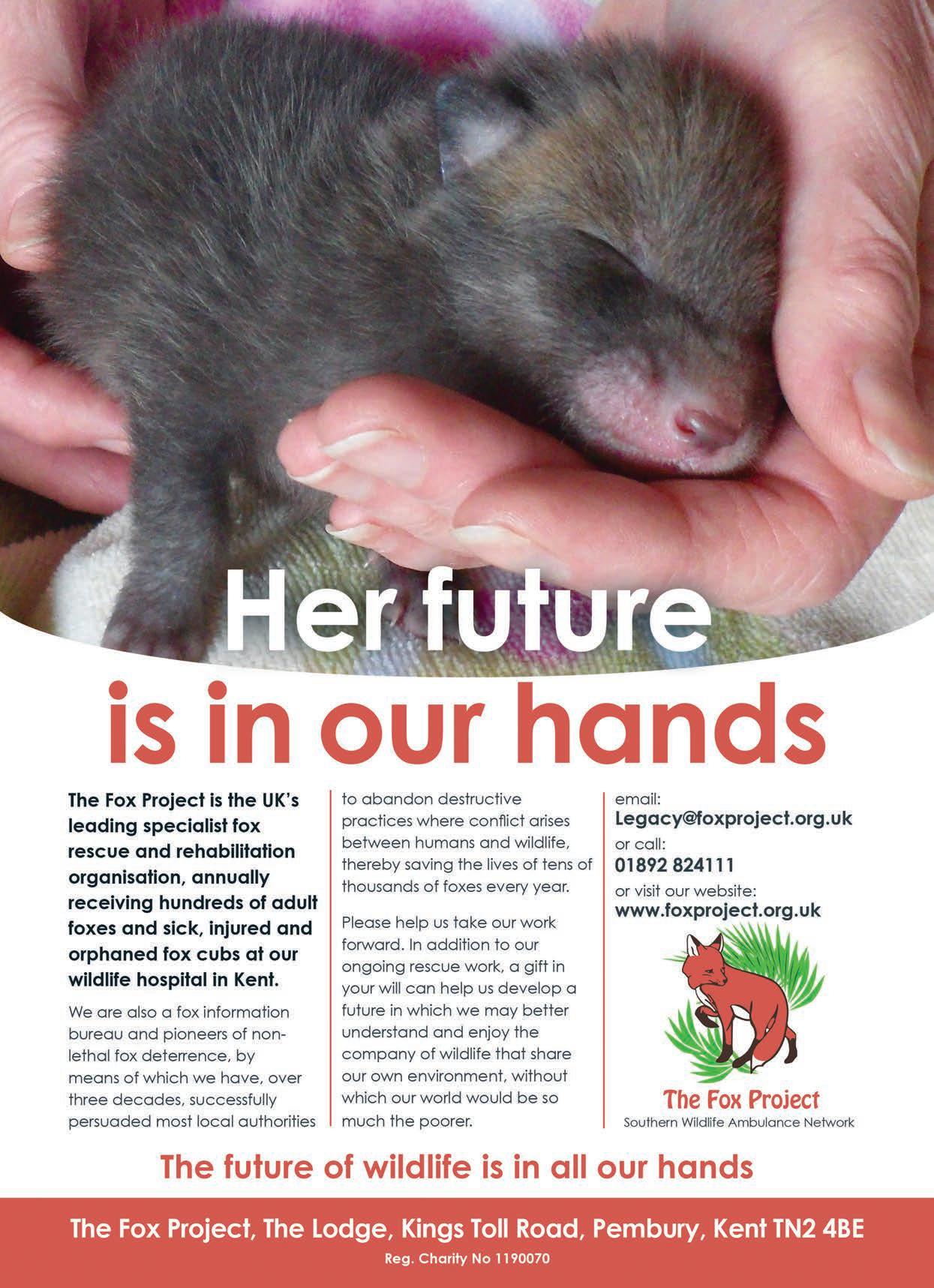
[ IN THE BEGINNING, The Fox Project operated from a garden shed where, if they were hard pressed, two or three fox cubs might be under their care. Fast forward 34 years and you find them spread over multiple sites with an annual rescue total of over 1,400 foxes.
Currently, the operation revolves around a hospital unit in Paddock Wood near Tunbridge Wells in Kent and a cub unit at nearby Pembury – both rented – plus around 20 home foster units run by volunteers. The system works well, but capacity is reaching its limit and building their own hospital would allow the charity to bring together the main units with a small office, overnight staff quarters, storage space and a workshop.
While the hospital project is vital to their future, and to the futures of countless sick and injured foxes and orphaned cubs, they have no illusions that some of them will have more grey hair at the end than they started out with! Just finding a place to call home will be the first hurdle. Affording it will be the next.
Although the proceeds of a couple of significant legacies have been ring fenced for the purpose, the charity find themselves competing for land that keeps rising in value – and against housing developers and property investors who, inevitably, have more funds and resources available than they do.
Your legacy could help swing the odds in their favour and guarantee The Fox Project and its many patients a secure future. q
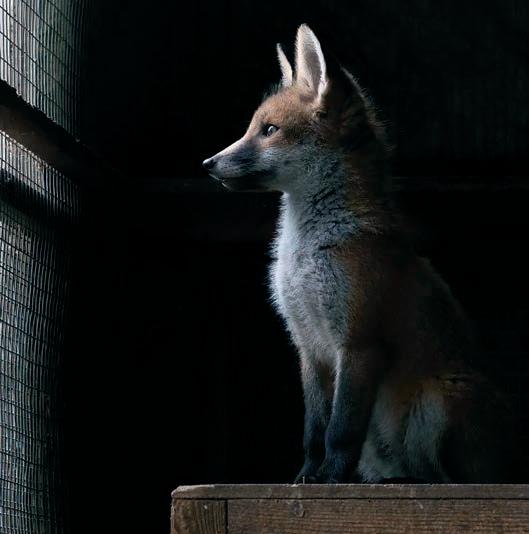
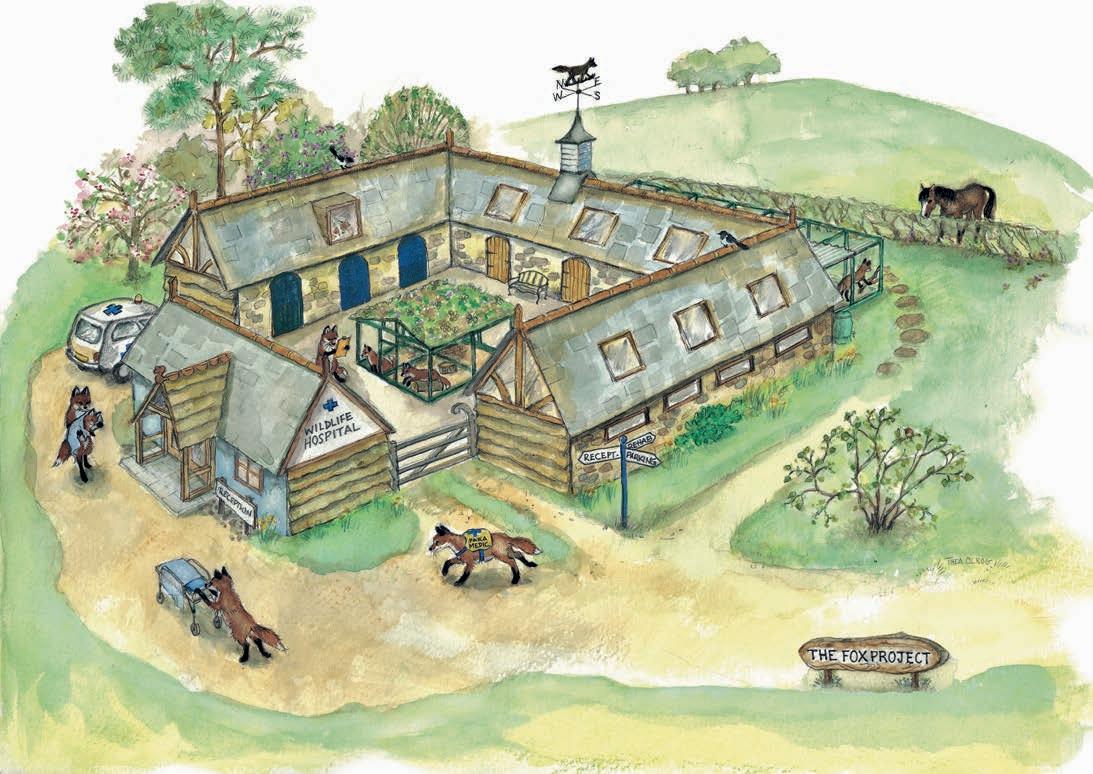


[THE HORSE RESCUE FUND is a long-established equine charity. In 2025 they will be celebrating 75 years of service to the equine welfare industry. The charity has a colourful history of pioneering work in changing attitudes towards equine welfare. Most recently they have had to adapt to helping horses relinquished to them due to economic problems or those associated with the social welfare issues of their owners.
As a smaller charity in the equine sector, it is unfortunately often overlooked for funding, which makes the 75th anniversary year celebrations all the more important for raising awareness as well as funds.
In the 75 years since the fund was established by the Walbancke family, hundreds of horses have been given a second chance at a happy life. From early days in their back garden to the purpose-built yard occupied today, the ethos has remained the same – Rescue, Rehabilitate, Rehome
The charity currently has over 50 horses out in homes and can house up to 20 horses, ponies or donkeys on the yard, if needed. These horses, once in their care, are treated as individuals – staying at the yard until they are emotionally and physically ready for rehoming.
A spokesperson commented: “We feel that although we are not trying to turn over numbers, as a smaller charity we can make a real difference to the individual horse, offering a lifetime of ongoing care and support.”
This year the charity is running far more events than they normally do to celebrate the Diamond Jubilee! They need as many people as possible to participate and help them to continue their vital work. They aim to raise a substantial amount between now and December. The details of the events planned can be found on the website. Whether you are local to the charity or not there are many things you can participate in. No horse? no problem –there are non-riding events planned as well!
There will be an event taking place every month from March, keep an eye on the Horse Rescue Fund on social media and their website for details. q
For 140 years Edinburgh Dog and Cat Home has been there for the dogs and cats who need us.
We give our all to keep loving homes whole with support from our pet food banks. And when that’s not possible, we take in the animals who need us and love them as if they were our own.
Two in five animals cared for at the Home are supported by the generosity of legacy gifts.
With the help of these funds, hundreds of dogs, cats and their people have been given an opportunity to form bonds that last a lifetime.
And it doesn’t stop there. Gifts in Wills ensure that this unconditional love and loyal companionship will be carried forward for future generations.
Whether it's the beloved dog who’s been with you through thick and thin, or the cat who greets you with an affectionate headbutt every time you come home, your pets are always there for you.
By leaving a gift in your Will to Edinburgh Dog and Cat Home, you will always be there for them too.
Head of Fundraising, Gillian MacAulay says: “This support can transform the lives of the hundreds of vulnerable animals who need our help each year – for as long as they need it. By leaving a gift, your love and compassion for animals can live on.”
To find out how to make a lasting contribution, please contact Aiste Klisyte, Legacy Officer at aiste@edch.org.uk or visit edch.org.uk/gifts-in-wills
[IN JULY the Chartered Institute of Fundraising unveiled new guidance aimed at strengthening best practice and accountability in face-to-face fundraising across the sector.
Responding to sector challenges and evolving fundraising practices, and in the wake of the Fundraising Regulator’s Market Inquiry into sub-contracting in face-to-face fundraising, the guidance sets out clear expectations for charities and fundraising agencies, with new sections covering sub-contracting arrangements, safeguarding of fundraisers, transparent job advertising and robust due diligence.
The updated framework – which is the first major revision to this guidance since 2016 –provides advice for charity leaders and trustees on how they should manage outsourced fundraising responsibly, understand and ensure transparency in payment models and protect frontline workers through fair working conditions, whistleblowing policies and support in potentially isolated roles like door-to-door fundraising.
Claire Stanley, director of policy and communications at the Chartered Institute of Fundraising, commented: “Working closely with our membership, and our Public Fundraising Advisory Panel in particular, we have created an in-depth piece of guidance exploring the relationship between charity and agency: highlighting best practice in adherence to the
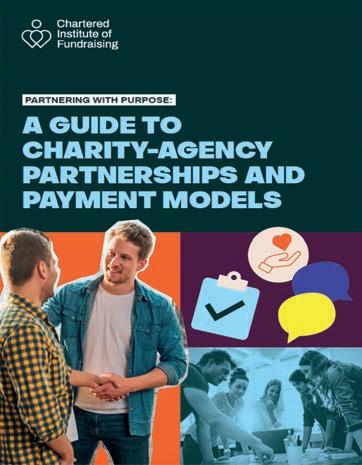
code. The Fundraising Regulator has been clear that trustees and senior leaders of any charity engaging in face-to-face fundraising need to be aware of which organisation is representing them, and we have set that out in this guidance.
“We have also set out expectations for the safeguarding of fundraisers within this guidance – that they have fair working conditions, full transparency over payment models, and
that they are being fairly and appropriately remunerated for the work they are doing and the hours they have worked.
“In addition to this, we expect policies to be in place to safeguard fundraisers in the field – particularly if they are participating in more isolated roles like door-to-door fundraising. Appropriate whistleblowing policies should also be in place to ensure that fundraisers feel safe to raise concerns if they have them.
“This guidance has been created for the sector, by the sector, and we would like to thank everyone who was involved in this piece of work.”
Jim Tebbett, head of proactive regulation and projects at the Fundraising Regulator, said: “We welcome the Chartered Institute of Fundraising’s updated guidance on charityagency partnerships and payment models, which responds directly to a key recommendation from our 2024 market inquiry into subcontracting in face-to-face fundraising.
“This new guidance supports charities and agencies to build strong, transparent and accountable fundraising partnerships: something our inquiry showed is essential to maintain public trust in the sector. Many charities and agencies have already taken steps to learn from and implement the recommendations from the market inquiry, and this guidance will help them to continue to do so.” q



[ CARING FOR UNCLAIMED stray dogs can be challenging – and the rising numbers are having an impact on Hope Rescue’s already stretched resources. Most of these dogs have been deliberately abandoned and Hope has committed to never leaving a dog behind regardless of age, breed, health or behaviour. This means that many of the dogs that come to Hope need additional care, be that through veterinary treatment, behaviour and training support, or both.
Hope currently holds the local authority stray dog contracts for Rhondda Cynon Taf, Bridgend, Caerphilly and the West Side of the Vale of Glamorgan. They also commit to take in every unclaimed stray from the county boroughs of Merthyr, Blaenau Gwent and Torfaen, resulting in over 1,000 dogs a year entering the rescue centre.
Vanessa Waddon, CEO, said: “We’re living through an animal welfare crisis and there is no end in sight, with the impact of lockdown followed by the cost-of-living crisis bringing more dogs than ever through our doors. We’re always at capacity, struggling to pay rising costs and impacting our ability to raise money.
“It currently costs around £3m each year to keep Hope Rescue afloat, so we need your support now more than ever.
“This crisis is not ending any time soon, and we urgently need your support to not only take in these dogs but reduce their length of stay – which both improves welfare and enables us to help more dogs that need us.” q
• Find out more about how you can support Hope Rescue at www.hoperescue.org.uk or contact fundraising@hoperescue.org.uk
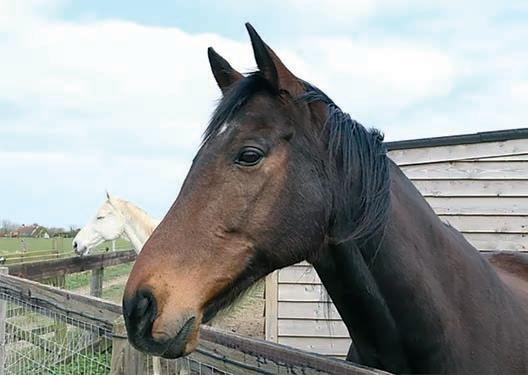
[ THE
now live in a new home at Sink Farm in Woodbridge,
and are cared for alongside the
Sink Farm is the colony stud for the Suffolk Punch Trust charity, who continue their important and essential work in preserving this unique breed. q
• For more information on either charity please contact Tracey Pettitt, stud manager or David Clarke, finance director, on 07768 025128.
Heartbeat Homes for Horses, Sink Farm, St David’s Lane, Hollesley, Woodbridge, Suffolk IP12 3JR
[ SINCE 2023, a number of organisations from across the philanthropy and charity sectors have met to discuss policy proposals that could provide a framework for a renewed culture of philanthropy and charitable giving in the UK.
The proposals covered six areas:
• Understanding and engaging with philanthropy
• Enabling an effective philanthropy sector
• Making use of local connection
• Supporting more giving by individuals
• Supporting more giving by companies and in workplaces
• Promoting and celebrating philanthropy Collectively, they offer the basis for a national strategy for philanthropy and charitable giving. They reflect a commitment from the philanthropy sector to work alongside Government to maximise philanthropy and its impact.
The proposals are not static. Organisations from the philanthropy and charity sectors continue to meet regularly to make them as practical and actionable as possible.
The latest version of the Draft National Strategy for Philanthropy was published in June and is available to download from the website of The Beacon Collaborative, which maintains the strategy in collaboration with the Charities Aid Foundation and New Philanthropy Capital. The strategy aims to see 2% of GDP donated to charity in the next 10 years.
Why do we need a national strategy for philanthropy and charitable giving?
Like all other significant financial decisions, the decision to make philanthropic gifts requires encouragement, planning and support.
The decision to become a philanthropic funder begins with an awareness of the

importance of philanthropy to charities and wider civil society. Individuals need to be able to consider their options by finding out information about causes and charities that are seeking support – locally, nationally or internationally. Plus, there needs to be mechanisms in place to facilitate giving, not just as a single transaction but through connections, relationships and structures that support a lifetime of philanthropy.
In commercial and retail settings, these stages of awareness, consideration, execution and long-term engagement are well-established steps in a customer journey. Every step requires the right level of information, support and guidance.
Charity fundraisers also use them to take people on a donor journey with their individual charities.
Yet, when it comes to philanthropic journeys, the infrastructure isn’t strong
[ THE BRITISH CHELONIA GROUP publishes six newsletters a year containing details of meetings, short articles, news items and veterinary notes. Their journal Testudo is published annually and contains original articles and reviews on all aspects of turtles, terrapins and tortoises – their biology, conservation, welfare, veterinary care and husbandry. The group also organises symposia.
As well as the yearly appeals in aid of specific international causes in chelonia research and survival, the BCG assists other worthy causes in support of its aims with grants. They invite grant applications from organisations and individuals engaged on the work of chelonia conservation – such as zoos, universities, zoologists and students in this country and overseas. q
enough to support every donor, every step of the way.
• How aware are we, as a society, of the importance of philanthropy to civil society?
• How easy is it to find specific charities and to consider the impact of their work?
• Are the mechanisms that support giving to charities as frictionless as possible?
• Can we provide the right conditions to enable a lifetime of giving?
The philanthropy sector, and many charities, can help with those questions; but if we want to grow giving, then we need to invest in the infrastructure that supports it – at scale, everywhere. That ambition will require a joined-up, collective effort and, on a national scale, needs to be led by government, because only government can set the tone on the role philanthropy plays in our society.
Working together on a national strategy, the philanthropy and charity sectors are developing actionable proposals on the investment and innovation that could create a truly enabling environment for philanthropy and charitable giving. It is an invitation from the sector to work in partnership with government to grow giving in support of our communities and wider civil society.
Welcoming the launch of the latest version in June, Lucinda Frostick, director of Remember A Charity, said: “This strategy sets out a co-ordinated pathway for change, with clear recommendations for how government can work with the sector and others to build and grow the philanthropy movement across the UK. We’re delighted to see such recognition within these proposals of the key role of charitable legacies in building the sector’s resilience and in enabling charities to meet the needs of beneficiaries.
“A collaborative approach is vital to achieve real change and we look forward to continuing to work with sector partners and policymakers to progress this strategy.” q
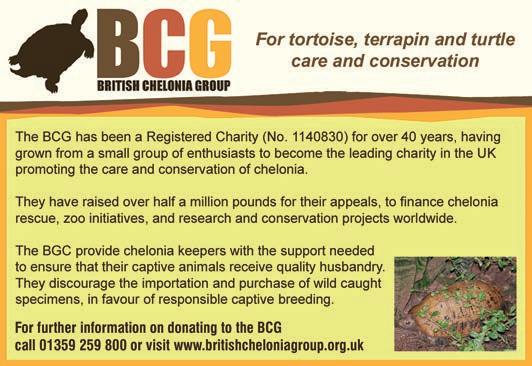
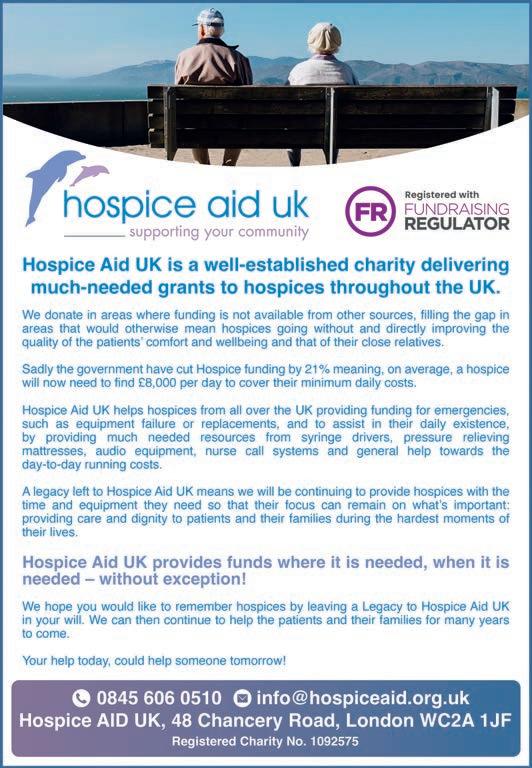


[ THE GOVERNMENT has been running a consultation on reforms to public procurement. The changes could significantly affect how charities and voluntary organisations deliver public services.
Voluntary organisations deliver nearly £14.2bn worth of public services each year. Many face persistent barriers when bidding for contracts, including overly competitive processes that hinder collaboration and approaches to social value that don’t reflect the sector’s strengths.
In recent years, the rules for how authorities purchase goods and services have changed in a number of ways. The Procurement Act 2023 introduced a new competitive, flexible procedure. It replaced the ‘light-touch’ regime: a simpler process that previously applied to services like health and care. The new procedure now applies across all procurement.
Health services were removed from procurement regulations and are now covered by a different set of rules called the Provider Selection Regime, which aims to support more collaborative commissioning.
The National Procurement Policy Statement now requires central government departments to set targets for spending with voluntary, community and social enterprise (VCSE) organisations.
Key proposals include:
• Mandating public bodies to set direct VCSE spending targets
• Focusing social value requirements on jobs and opportunity for high
• value contracts

• Taking a more standardised approach to social value
• Clarifying where a full competitive procedure is not required for
• services that support people the government defines as ‘vulnerable’
• Excluding providers who can’t demonstrate they pay invoices within
• 60 days.
The proposals could open up more opportunities or create new barriers for charities that deliver public services or work with other providers to add social value.
The consultation closed on 5 September. q

[AS ITS 100th anniversary approaches, international charity World Horse Welfare continues to be a committed champion of equine welfare with a focus on strengthening the horse-human relationship.
Its mission is to help all horses, ponies, donkeys and mules, including horses in sport and leisure, horses used for work and production as well as horses in need. Horses like Elouise.
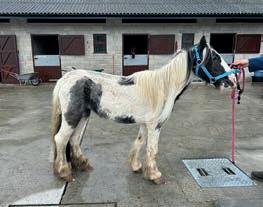

with respect, compassion and understanding. Working with horses, horse owners, communities, organisations and governments they are committed to helping improve welfare standards and stamp out suffering in the UK and worldwide.
Three-year-old Elouise was discovered alone and vulnerable on a fell in Northumberland, severely underweight, suffering from a lice infestation, covered in hundreds of ticks and on the edge of survival. Frightened, extremely ill and alone, the ticks were literally sucking the life from her. She was taken to World Horse Welfare’s Penny Farm Rescue and Rehoming Centre near Blackpool – one of four centres they have throughout the UK – where staff mobilised everything to give her a chance of life.
It quickly became apparent that the level of neglect that Elouise had suffered had caused liver issues and her malnutrition was so critical that her immune system was weakened to the extent that she was barely hanging on to life. However, thanks to World Horse Welfare reaching her in time, Elouise made a remarkable recovery.
The life-saving care World Horse Welfare gave Elouise transformed her life and this sweet and gentle pony is now thriving, with a lifelong promise of security as part of the World Horse Welfare family.
The charity’s vision is for a world where every horse is treated
The rising costs of caring for horses like Elouise – from emergency veterinary treatment to much-needed nutrition and day-today care – have increased from an average of £5,000 a year to over £7,000. They receive no government support, but depend entirely on voluntary donations to help the 300 horses they rescue each year as well as to fund their global mission advocating for horses worldwide.
Founded in 1927 by Ada Cole (below) as a campaigning organisation to prevent the live export of horses from Britain to slaughter, they remain a leading voice for horses, taking great pride in being realistic, compassionate and forward-thinking.
They are steadfast in their goal to improve the lives of horses in the UK and around the world through care, research, education and influence. They need those who care about animals to join them in that mission. q

• For further information please visit www.worldhorsewelfare.org
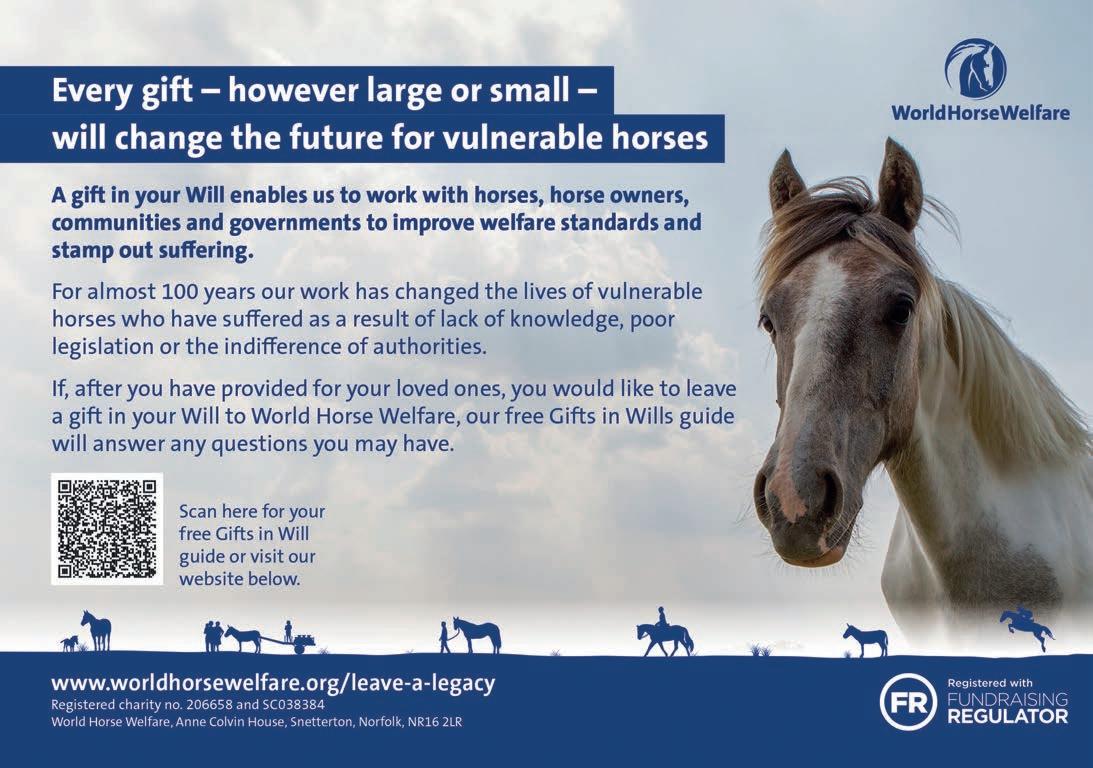
[THE CHARITIES AID FOUNDATION (CAF) distributed more than £1.20bn on behalf of individuals and businesses in its last financial year, its Trustees Report for 2024/25 shows. That represents an increase from £1.15bn the previous year. The report highlights how the funding supported the work of hundreds of thousands of charities around the world.
CAF works at the centre of the giving world, collaborating with corporate and individual donors to enable them to give more effectively, strategically and impactfully. Last year, private and corporate clients in the UK, US and Canada entrusted more than £1.34bn to CAF to help charities do more of their life-changing work where and when it matters most.
Those contributions increased by £188m compared to the previous year. Harnessing its expertise in global grant-making, CAF America supported charities around the world with grants totalling £676m.
In the UK, CAF Bank provides specialist banking to help charities and social enterprises manage their finances, so they can continue to support the causes and communities that matter to them. The bank’s lending continued to grow, advancing £41.5m in loans to help charities and social purpose organisations improve their sustainability and further their impact.
Neil Heslop OBE, chief executive of the Charities Aid Foundation, commented: “It is one of the privileges of working at CAF that we get to play a part in thousands of individual stories of giving, just a handful of which are highlighted in this Annual Report. These stories remind us that distributing over a billion pounds to charities is the result of the generosity of others and their individual connections to causes the world over.
“Thanks to the generosity of the donors we work with and the dedication of the charities they support, it is heartening that this has been a record year for CAF. But philanthropy and charitable giving have never been more needed. Against a backdrop of global political and economic uncertainty, retrenchment in international aid and other fiscal constraints, securing greater and more impactful philanthropy – and its encouragement – is now essential.” q
[LEGACIES MEAN SO much to the team at Last Chance Animal Rescue. These wonderful gifts have helped them to rescue, rehabilitate and re-home so many abandoned, abused and unwanted dogs, puppies, cats, kittens, rabbits and guinea pigs who otherwise would have had no future.
The charity understand the wishes of its kind benefactors who have considered them in their Wills. A spokesperson said: “We know they want their generous gift to us to be used directly to save lives, provide the very best of care and to find loving homes.

“Legacies really do provide the gift of life and Last Chance Animal Rescue can now, after much planning and prudent use of funds, offer our life saving services to so many more needy pets. We are delighted to announce we now have a second rescue and rehoming centre in Kent, giving hope and a true last chance to so many.
“Sadly we cannot thank those who have enabled this wonderful achievement but are extremely grateful to all those who are currently considering helping us now and in the future to continue our work.” q Pixie




[ BEAR BROTHERS Benji and Balu only ever knew a life of misery in a tiny concrete cage on the side of a restaurant in Azerbaijan. Fed on srcaps of food from the kitchen or by curious tourists, they were malnourished and suffered physical and psychological issues as a result of their 13 years of confinement. They would chew on the bars of their cage out of desperation to escape and, as a result, Balu had to have two teeth removed.
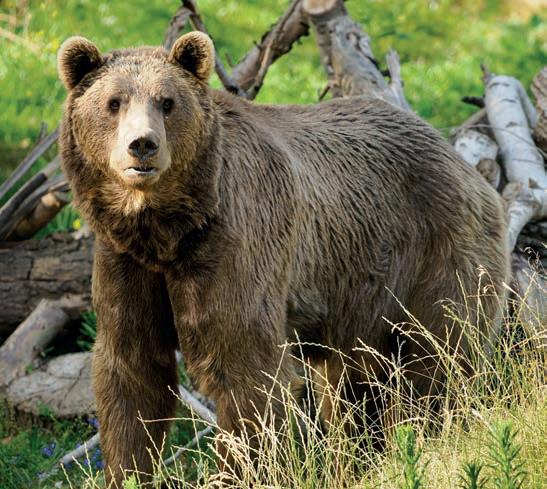
Rescued by the Wildheart Animal Sanctuary, these bears now flourish in a purpose built sanctuary where they have 3,500 sq m of ponds, trees, streams and caves to explore, providing them with everything they need to live out their days in peace.
At Wildheart they work tirelessly to ensure forgotten animals, like Benji and Balu, have a second chance at life – one in which they are free from fear and distress. q

[A NEW DATE has been made available by Charity Digital for their cyber essentials training course: Mastering the Five Key Controls for Digital Security. The new date is 7 October.
The three-hour workshop offers an accessible introduction to cyber essentials, a government-backed framework designed to help organisations protect themselves from the most common cyber threats. Over two engaging sessions the course will break down the scheme’s five critical controls and run a live hack, including reconnaissance and initial access, where participants will play a lead role in the operation. By the end of the training, they’ll be equipped with actionable strategies to strengthen their organisation’s digital defences. Navigating the world of cyber security can be intimidating, especially with the everchanging threats and technical language. Yet, in a world where cyber attacks are increasingly targeting organisations of all sizes, including charities, it’s crucial to understand how to defend your assets.
According to Charity Digital, half of businesses and around a third of charities in the UK reported a cyber security breach or attack in the past 12 months. Without the right safeguards in place, organisations risk exposing themselves to data breaches, financial losses and reputational harm.
This workshop will be led by members of the Delta Cyber Security team, with over 30 years of experience in cyber security. Their approachable teaching style ensures that technical concepts are easy to grasp, and their deep expertise guarantees you’ll leave with practical insights.
The training is split into two interactive sessions, each lasting around 80 minutes, with a short break in between.
Session 1: Foundations of Cyber Security and the Cyber Essentials Framework
• An overview of cyber essentials: why it matters and how it works
• Firewalls explained: setting up the first line of defence
• Secure configuration best practices for devices and systems
• Update management: why updates are vital and how to stay on top of them
Session 2: Cyber Essentials Framework
Continued and Cyber Security Hack Simulation
• Malware protection: spotting threats and defending against attacks
• User access controls: protecting sensitive data by managing permissions
• Interactive group activity: the hack simulation

[FOR OVER 80 YEARS Ferne Animal Sanctuary has given hope to animals in desperate need, working tirelessly to find forever homes for those who have never known warmth and safety or offering lifelong care for sanctuary residents.
Much of the support their animals receive – including food, a comfortable bed and veterinary care – is only made possible thanks to the generosity and support of those who believe that every animal deserves a second chance.
By leaving a gift in your will to Ferne Animal Sanctuary, you create a lasting impact that extends far beyond your lifetime. Your legacy will ensure that countless animals receive the love and care they deserve, providing a lifeline for those who have nowhere else to turn.
Not only will your gift secure a brighter future for those who need it most, but it’s also a testament to your unwavering dedication to the wellbeing of animals. Consider leaving a gift to Ferne Animal Sanctuary and help to give every animal a chance to feel safe, happy and loved. q
In this hands-on exercise, participants will collaborate to simulate an attack and compromise a business email account. They’ll:
• Step into the shoes of an attacker, learning how accounts are compromised
• Learn how attackers use open source information and tools
• Uncover the steps needed to prevent such incidents
This practical experience will empower those attending to identify vulnerabilities and adopt effective countermeasures, both in their professional and personal environments.
The workshop is designed for professionals from all backgrounds: whether a charity leader, IT officer or simply someone keen to understand cyber security essentials. No prior technical knowledge is required. The training offers a supportive environment to ask questions, discuss challenges and gain confidence in managing cybersecurity risks.
Tickets cost £99 + VAT, available from the Charity Digital website charitydigital.org.uk
As part of the course, those attending will have access to a follow-up email Q&A service with Delta after the event, providing ongoing support for any additional questions or concerns. q

At the beginning of September, Rosterfy – the volunteer management platform – reported it had achieved a remarkable milestone: 150 million hours of volunteering. Here, Rosterfy CEO Bennett Merriman (pictured) shares his thoughts on the transformative nature of volunteering and the impact within communities and asks: what could you achieve with 150 million volunteer hours?
[VOLUNTEERS are the backbone of every community: driving non-profits, supporting vulnerable populations and enriching society by building a more connected and compassionate world. They are the glue that holds organisations together, stepping in to fill service gaps, foster social cohesion and strengthen resilience, and inspiring others to give


back. Their contribution is felt not only in economic terms but also in the health, culture and spirit of communities worldwide.
At Rosterfy, our mission has always been to connect communities to events and causes they’re passionate about. With volunteer demand at an all-time high and funding for internal resources under pressure, leveraging technology to scale has never been more important. Utilising technology to supplement the workforce and deliver impact is no longer just a ‘nice to have’, it’s a necessity.

That milestone naturally prompts the question: what kind of impact could 150 million hours of volunteering create in your community?
While the community impact of volunteer effort cannot be understated, beyond the social and cultural benefits, there’s also an enormous economic value attached to this milestone.
Recognising the financial contribution of volunteers is crucial, not only to celebrate their worth but also to ensure the long-term sustainability of volunteer involving organisations. When organisations understand and communicate their value it strengthens the case for further investment in people, resources and technology that support volunteers.
At Rosterfy we’re proud to empower organisations to measure, celebrate and amplify the impact of their volunteers. Because behind every hour logged is a story of generosity, community and hope.
• NCVO defines volunteering as ‘when someone spends unpaid time doing something to benefit others. Volunteering can be formal and organised by organisations or informal within communities. It should always be a free choice made by the person giving up their time’.
Social value estimating tool MeasureUp recently estimated the combined economic and wellbeing value per year per regular volunteer in the UK at around £3,400. q
[THE MISSION of Three Counties Dog Rescue is to accept, care for and find homes for unwanted, lost and stray dogs and cats and to ensure their wellbeing afterwards. The charity was founded in 1971 and since then they have improved the lives of over 7,800 dogs and cats.
Before rehoming, all animals are vet checked, neutered, vaccinated, microchipped and kept in suitable conditions. Rehabilitation costs are a major part of the charity’s annual expenditure of over £200,000. Healthy animals are never put down. As part of that non-destruction policy, several elderly dogs are kept in long term foster care. However, this means that the charity can incur large veterinary costs to maintain a dog’s health while they await a new permanent home. They now provide boarding and cremation services with profits supporting the Rescue. Every penny raised goes to improving the lives of dogs and cats. Three Counties Dog Rescue is run entirely by voluntary and unpaid helpers, who also meet their own expenses. q
The range of charities which depend on legacies to carry out their valuable work is a broad one. Those that are represented in this publication are listed below, grouped according to the area of activity in which they operate.

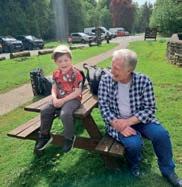

Friends of the Animals 4/5
Southern Thailand Elephant Foundation 8
Beneath the Wood Sanctuary 8
Birmingham Dogs Home 9
Animal Action Greece 10
The Lord Whisky Sanctuary Fund 11
WECare Worldwide 13
Paws2Rescue 18
Suffolk Owl Sanctuary 19
Catholic Concern for Animals 20
Tiggywinkles 20
Hessilhead Wildlife Rescue 21
The Fox Project 22/23
The Horse Rescue Fund 24
Edinburgh Dog and Cat Home 24
The Retreat Animal Rescue 25
Hope Rescue 26
Heartbeat Home for Horses 26
British Chelonia Group 27
Essex Horse and Pony Protection Society 29
World Horse Welfare 30
Last Chance Animal Rescue 31
Wildheart Animal Sanctuary 32
Ferne Animal Sanctuary 33
Shire Horse Society 34
Three Counties Dog Rescue 34




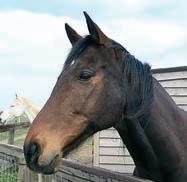
Prostate Cancer Research 1
Pain Relief Foundation 2
Sight Research UK 6
CLEFT 16
Cancer Prevention Research Trust 17
Hospice Aid UK 28
Brain Research UK 28
The British Association for Cancer Research 28
Replacing Animal Research 40
Hypo Hounds 7
Parenting Together 14
Kidney Kids Scotland 15
HEALTH & DISABILITY
Independent Diabetes Trust 2
Royal College of Surgeons of England 12
National Federation of the Blind of the United Kingdom 13

ZANE: Zimbabwe A National Emergency 16
